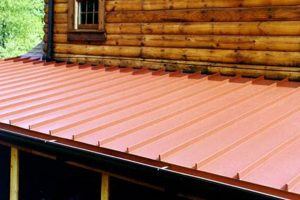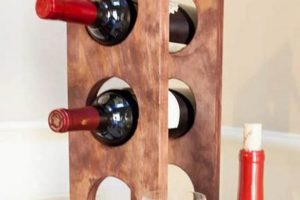A self-constructed refreshment kiosk, typically offering a citrus-based beverage, provides an opportunity for individuals, particularly children, to engage in entrepreneurial activities. For example, participants might design and build a small, portable structure, decorate it attractively, and sell lemonade to passersby.
This project fosters creativity, problem-solving skills, and basic business acumen. It allows participants to experience the satisfaction of building something with their own hands and managing a small-scale business operation, potentially generating income and learning about customer service. Historically, this activity has served as an introductory experience to commerce and self-reliance.
The following discussion will delve into aspects such as design considerations, material selection, construction techniques, and effective strategies for promoting and operating such a venture.
Construction and Operational Tips
Optimizing the construction and operation of a self-built beverage kiosk enhances its appeal and profitability. Careful planning and execution are essential for success.
Tip 1: Material Selection: Prioritize durable, weather-resistant materials such as treated lumber or exterior-grade plywood. These choices ensure longevity and minimize maintenance requirements.
Tip 2: Structural Integrity: Reinforce corners and joints with screws and brackets to withstand frequent assembly and disassembly if the structure is portable. This enhances stability and prevents premature wear.
Tip 3: Design for Visibility: Incorporate a clear and attractive sign displaying pricing and offerings. Legible fonts and vibrant colors improve customer recognition and recall.
Tip 4: Ergonomic Considerations: Design the serving area with appropriate counter height for ease of use. This reduces strain during extended periods of operation and enhances efficiency.
Tip 5: Hygiene Practices: Maintain a clean and sanitary workspace. Provide hand sanitizer and use disposable cups to ensure food safety standards are upheld.
Tip 6: Strategic Location: Choose a location with high foot traffic and visibility, ensuring compliance with local regulations and permit requirements. Proper placement maximizes potential customer reach.
Tip 7: Pricing Strategy: Conduct a market analysis to determine competitive pricing that balances profitability and customer appeal. Consider offering different sizes or flavor variations to cater to diverse preferences.
Implementing these strategies contributes to a robust and profitable venture. The focus on durability, visibility, and hygiene ensures a positive customer experience and facilitates long-term success.
The subsequent section will explore marketing strategies to further enhance the reach and profitability of the establishment.
1. Design Aesthetics
Design aesthetics directly influence the customer’s initial perception of a self-constructed beverage kiosk. A visually appealing stand is more likely to attract attention and encourage patronage than a poorly designed one. The correlation between aesthetic quality and customer engagement is significant. For example, a stand decorated with bright, coordinated colors, clear signage, and thematic elements (e.g., lemons, stripes) presents a professional and inviting image. Conversely, a stand with faded paint, cluttered displays, or inconsistent branding may deter potential customers.
The importance of design aesthetics extends beyond mere visual appeal. A well-designed stand can communicate values such as cleanliness, quality, and attention to detail. For instance, the use of high-quality materials and meticulous craftsmanship conveys a sense of professionalism and reinforces the perception of a superior product. Conversely, a shoddy appearance may imply a lack of care in the preparation of the beverage. Consider the scenario of two identical stands offering the same lemonade at the same price. The stand with superior aesthetic appeal will invariably attract a greater customer base.
Therefore, a clear understanding of design principles is a critical component of a successful venture. Effective application of color theory, typography, and spatial organization can transform a simple structure into a compelling point of sale. The challenge lies in balancing aesthetic considerations with practical factors such as budget constraints and ease of construction. By prioritizing thoughtful design choices, operators can maximize their chances of success in a competitive market.
2. Structural Integrity
The structural integrity of a self-constructed beverage kiosk directly impacts its safety, durability, and overall functionality. A robust structure ensures the stand can withstand environmental conditions, prolonged use, and the weight of its contents, thereby minimizing the risk of collapse or damage.
- Material Selection and Load-Bearing Capacity
The selection of appropriate materials is paramount to ensuring adequate structural integrity. Materials must possess sufficient load-bearing capacity to support the stand’s roof, counter, and any stored supplies. For example, using thin, untreated wood for the frame could lead to sagging or collapse under moderate weight, whereas using appropriately sized lumber or reinforced materials provides a stable and safe structure. The choice of fasteners, such as screws or bolts, also contributes to the overall strength and stability.
- Joint Reinforcement and Stability
The points where structural members connect are critical areas for ensuring stability. Reinforcing joints with metal brackets, gussets, or wood glue strengthens these connections and prevents movement or separation. For example, simply nailing together corners may result in a weak and unstable joint. Proper reinforcement distributes stress across the joint, enhancing its resistance to shear and bending forces.
- Resistance to Environmental Factors
The structural integrity must account for environmental factors such as wind, rain, and sunlight. A properly constructed stand incorporates features like angled bracing or a secure foundation to resist wind loads. Water-resistant materials and proper sealing prevent water damage that can weaken the structure over time. Protection from prolonged sun exposure minimizes warping or cracking of materials. Ignoring these factors can lead to premature degradation and eventual failure of the structure.
- Compliance with Safety Standards
Although often not subject to formal building codes, adhering to general construction safety principles is crucial. This includes ensuring a stable foundation, avoiding sharp edges or protruding elements that could cause injury, and providing adequate ventilation if enclosed. Considering potential hazards, such as electrical wiring or flammable materials, and implementing appropriate safeguards further enhances the safety and structural integrity of the stand.
Ultimately, a structurally sound self-constructed beverage kiosk not only protects its occupants and customers but also represents a commitment to quality and professionalism. Neglecting structural integrity can lead to costly repairs, safety hazards, and a negative impact on the business’s reputation. A structurally robust stand provides a foundation for long-term success.
3. Material Durability
The lifespan and operational effectiveness of a self-constructed beverage kiosk are directly correlated with the durability of the materials used in its construction. This is a fundamental consideration, as the structure is typically exposed to varying weather conditions, frequent handling, and the general wear and tear associated with commercial activity. Material selection, therefore, is not merely an aesthetic choice but a critical factor influencing the long-term viability of the enterprise. For instance, using untreated softwood for structural supports will result in rapid degradation due to moisture absorption, insect infestation, and eventual structural failure. Conversely, utilizing pressure-treated lumber or composite materials inherently increases the stand’s resistance to these factors, extending its usable lifespan and reducing maintenance costs.
The practical implications of neglecting material durability extend beyond mere structural integrity. A dilapidated or poorly maintained stand projects a negative image, potentially deterring customers and impacting sales. Consider a scenario where a stand constructed with flimsy materials begins to show signs of weathering or damage shortly after its launch. Customers may perceive this as indicative of a lack of attention to detail or a general lack of professionalism, leading them to patronize competing establishments. Furthermore, frequent repairs or replacements resulting from the use of substandard materials translate into increased operational costs and lost revenue during periods of inactivity. The selection of durable materials, such as UV-resistant paints, waterproof sealants, and rust-proof hardware, is an investment that yields long-term benefits in terms of appearance, functionality, and profitability.
In conclusion, material durability is an indispensable element in the design and construction of a self-constructed beverage kiosk. The selection of appropriate materials directly influences the structure’s longevity, aesthetic appeal, and operational efficiency. A commitment to utilizing durable materials represents a sound business practice, minimizing maintenance costs, enhancing customer perception, and ultimately contributing to the sustained success of the venture. The initial investment in high-quality materials is offset by the long-term benefits derived from a stable, reliable, and visually appealing structure.
4. Location Permits
The operation of a self-constructed beverage kiosk is often contingent upon securing the necessary location permits from local authorities. This regulatory requirement exists to ensure public safety, maintain order, and enforce zoning regulations. The absence of proper permits can lead to fines, forced closure of the stand, and potential legal repercussions. Therefore, understanding and complying with local permitting procedures is a critical step in establishing a legitimate and sustainable enterprise. For example, a stand operating without a permit in a residential area might violate noise ordinances or obstruct pedestrian traffic, prompting intervention from municipal authorities.
The specific requirements for location permits vary depending on the jurisdiction. Generally, these permits address issues such as food safety, sanitation, business licensing, and zoning compliance. Food safety permits ensure that the beverage preparation and handling meet health standards, preventing the spread of foodborne illnesses. Business licenses legitimize the operation as a legal entity and may require adherence to specific operational guidelines. Zoning regulations dictate where commercial activities can occur, preventing conflicts between residential and commercial land uses. An illustrative case involves a stand located near a school zone without the necessary permits, potentially leading to fines and restrictions on operating hours due to proximity to a sensitive area.
Navigating the permitting process requires proactive engagement with local government agencies. This involves researching the specific requirements, completing the necessary application forms, and potentially undergoing inspections. Failure to comply with these procedures can result in significant setbacks, impacting the profitability and longevity of the venture. Adherence to permitting regulations demonstrates a commitment to responsible business practices and fosters a positive relationship with the community and local authorities. Therefore, securing appropriate location permits is not merely a formality but an essential component of a successful self-constructed beverage kiosk operation.
5. Pricing Strategy
Effective pricing strategy is critical for the financial viability of a self-constructed beverage kiosk. Determining an optimal price point necessitates careful consideration of various factors to maximize profit margins while remaining competitive and appealing to potential customers.
- Cost Analysis
A thorough cost analysis forms the foundation of any sound pricing strategy. This involves identifying and quantifying all direct and indirect expenses associated with producing and selling the beverage. Direct costs include the cost of ingredients (lemons, sugar, water), cups, straws, and any other consumables. Indirect costs encompass expenses such as the cost of materials used to build the stand, signage, and any applicable permit fees. Accurate cost assessment ensures that the selling price covers all expenses and contributes to profitability. For example, miscalculating the cost of lemons can result in selling the beverage at a loss, negating any potential profit.
- Competitive Analysis
Examining the pricing strategies of similar establishments in the vicinity provides valuable insights into market norms and customer expectations. Identifying the price points of competing beverage vendors allows the operator to position their offering competitively. This may involve matching prices, slightly undercutting them to attract customers, or justifying a higher price point by offering a premium product or service. A stand located near a park where other vendors sell similar beverages must consider these existing prices to attract customers without sacrificing profit margins.
- Perceived Value
The perceived value of the product plays a significant role in determining the price that customers are willing to pay. Factors such as the quality of ingredients, the presentation of the beverage, and the overall customer experience influence perceived value. A beverage made with organic lemons and presented in an attractive cup may justify a higher price compared to a beverage made with standard ingredients and served in a plain cup. Similarly, exceptional customer service and a clean, inviting kiosk can enhance perceived value and allow for a premium price.
- Pricing Psychology
Pricing psychology leverages specific pricing techniques to influence customer perception and purchasing behavior. For example, using odd-even pricing (e.g., $0.99 instead of $1.00) can create the illusion of a lower price. Offering tiered pricing options (e.g., small, medium, large) caters to different customer preferences and budgets. Promotional pricing strategies, such as offering discounts or bundling products, can stimulate sales and attract new customers. A “buy one, get one half off” promotion on slower days can increase volume and reduce potential waste.
In conclusion, a well-defined pricing strategy is integral to the success of a self-constructed beverage kiosk. By carefully considering cost analysis, competitive analysis, perceived value, and pricing psychology, the operator can establish a price point that maximizes profitability while remaining attractive to customers, ensuring the long-term sustainability of the venture. Failure to implement a thoughtful pricing strategy can lead to financial losses and ultimately, the failure of the operation.
6. Customer Service
Customer service constitutes a critical determinant of success for any entrepreneurial venture, including a self-constructed beverage kiosk. Positive customer interactions foster repeat business, generate favorable word-of-mouth referrals, and contribute to the overall brand image.
- Initial Engagement and Greeting
The initial interaction with a customer sets the tone for the entire transaction. A friendly greeting, a genuine smile, and attentive listening create a positive first impression. For instance, acknowledging a customer promptly and making eye contact conveys a sense of value and respect, encouraging them to proceed with a purchase. Conversely, indifference or a lack of enthusiasm can deter potential customers. The ability to project warmth and professionalism directly influences customer perception and purchase decisions.
- Order Accuracy and Efficiency
Ensuring order accuracy and efficient service demonstrates attention to detail and respect for the customer’s time. Prompt and accurate order fulfillment minimizes wait times and reduces the likelihood of errors. A systematic approach to order taking, preparation, and delivery is essential. For example, utilizing a clear and concise ordering system, confirming orders verbally, and preparing beverages efficiently minimizes delays and ensures customer satisfaction. Errors in order fulfillment or prolonged wait times can lead to frustration and dissatisfaction, negatively impacting the overall customer experience.
- Product Knowledge and Recommendations
Possessing comprehensive product knowledge enables the provision of informed recommendations and the answering of customer inquiries effectively. Being able to describe the ingredients, preparation methods, and flavor profiles of the beverages enhances customer engagement and builds trust. Offering personalized recommendations based on customer preferences demonstrates attentiveness and adds value to the interaction. For example, suggesting a specific flavor combination or offering a sample of a new beverage showcases expertise and enhances customer satisfaction. A lack of product knowledge can undermine credibility and limit the ability to cater to individual customer needs.
- Problem Resolution and Complaint Handling
Effectively addressing customer complaints and resolving problems is crucial for maintaining customer loyalty and mitigating negative feedback. A proactive approach to identifying and resolving issues demonstrates a commitment to customer satisfaction. Listening empathetically, acknowledging the customer’s concerns, and offering a sincere apology are essential first steps. Providing prompt and appropriate solutions, such as offering a replacement beverage or a refund, demonstrates a willingness to rectify the situation. A failure to address customer complaints effectively can lead to negative reviews and damage the reputation of the business.
These facets of customer service are interconnected and collectively contribute to the overall success of a self-constructed beverage kiosk. A positive customer experience, characterized by friendly interactions, accurate orders, informed recommendations, and effective problem resolution, fosters customer loyalty and contributes to sustained profitability. In contrast, neglecting customer service can lead to negative feedback, reduced sales, and ultimately, the failure of the enterprise.
Frequently Asked Questions
This section addresses common inquiries regarding the construction, operation, and regulation of self-constructed beverage kiosks, providing clarification and guidance to prospective operators.
Question 1: What is the typical cost associated with constructing a beverage kiosk?
The expense varies significantly depending on the materials used, the complexity of the design, and the extent of any hired labor. A basic structure constructed from reclaimed materials may cost under $100, while a more elaborate stand built with new lumber and custom features could exceed $500. Accurate budgeting and resource allocation are essential.
Question 2: Are permits always required for operating such a kiosk?
The necessity of permits is contingent upon local regulations. Most municipalities require at least a business license and potentially a food handling permit to ensure compliance with health and safety standards. Contacting the local city hall or relevant authorities is crucial to determine specific requirements.
Question 3: What constitutes an acceptable location for setting up a stand?
Acceptable locations are governed by zoning regulations and pedestrian traffic patterns. High-traffic areas such as parks, community events, and busy sidewalks are generally desirable, but must comply with local ordinances regarding commercial activity. Private property with the owner’s permission is also a viable option.
Question 4: What are the essential elements of a safe and sanitary beverage preparation area?
A safe and sanitary preparation area necessitates a clean, non-porous work surface, access to potable water for handwashing and utensil cleaning, and proper refrigeration for perishable ingredients. Adherence to food safety guidelines is paramount to prevent the spread of foodborne illnesses.
Question 5: What pricing strategies are most effective for maximizing profits?
Effective pricing balances cost recovery with market competitiveness. Analyzing the cost of ingredients, labor, and overhead is essential. Researching competitor pricing and adjusting accordingly is necessary. Psychological pricing techniques, such as odd-number pricing ($0.99 instead of $1.00), can also influence customer perception.
Question 6: What are the potential liabilities associated with operating a beverage kiosk?
Potential liabilities include product liability (if the beverage causes illness), slip-and-fall accidents on the premises, and failure to comply with local regulations. Maintaining adequate insurance coverage and adhering to safety standards are crucial for mitigating these risks.
In summary, the construction and operation of a self-constructed beverage kiosk require careful planning, adherence to regulations, and a commitment to safety and sanitation. Proper preparation and responsible operation increase the likelihood of a successful and sustainable venture.
The subsequent section will provide guidance on marketing strategies to promote the kiosk and attract customers.
Conclusion
The exploration of the “diy lemonade stand” concept reveals a multifaceted endeavor encompassing construction, operation, and regulatory compliance. Critical elements such as structural integrity, material durability, location permits, pricing strategy, and customer service significantly influence its success. Adherence to safety standards and sanitation protocols are paramount for both customer well-being and business longevity.
Successful implementation of a self-constructed beverage kiosk necessitates diligent planning, rigorous execution, and a commitment to responsible business practices. The information presented herein provides a foundational understanding for prospective operators, empowering them to navigate the complexities of this entrepreneurial pursuit and maximize their potential for sustained profitability.




![Build a Strong DIY Boat Motor Stand [Easy Guide] The DIY Hub: Creative Crafts, Repairs & Life Hacks Build a Strong DIY Boat Motor Stand [Easy Guide] | The DIY Hub: Creative Crafts, Repairs & Life Hacks](https://craftingdiycenter.com/wp-content/uploads/2025/07/th-3394-300x200.jpg)


